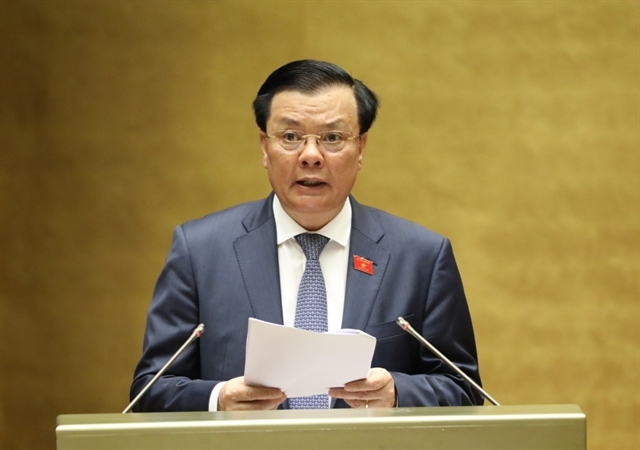 |
|
Minister of Finance Dinh Tien Dung presents a brief on the draft resolution on a special mechanisms for Hanoi in front of the National Assembly on Tuesday.
|
According to Minister of Finance Dinh Tien Dung, Hanoi has made significant strides in socio-economic development which in turn, help out the financial and budget situation of the whole country. However, the accelerating urbanisation and spike in population have put enormous pressure on the city’s infrastructure and institutions, leading to rampant pollution, traffic congestion and a range of social order and security issues.
While the NA has already released the Capital City Law in 2012, the new context demands special mechanisms that might stand at odds with existing laws and regulations but will be fitting with Hanoi's socio-economic scale.
It would also be allowed to use the remainder of the salary reform source to spend on development investment projects and implement social security systems and policies.
The length of the pilot period is supposed to be five years, in which Hanoi can make its own decisions regarding finance and budget, budget collection, outstanding debts and use of financial reserve funds.
Head of NA Finance and Budget Committee Nguyen Duc Hai, in charge of assessing the draft resolution, said that the committee agreed with the contents of the report and deemed it eligible for a fast-track consideration and approval at a parliamentary sitting at another date.
Regarding the proposal, which would allow Hanoi to retain 50 per cent of all land use fees obtained after selling off public assets attached to land, most comments within the committee said that while the fees should rightfully go into the central budget, the Government could let the city have it to invest in key infrastructure projects under the capital city’s development strategy towards 2030.
Regarding the authority to decide on the supplementation and increase on charges and fees, the Committee for Finance and Budget agreed with the Government’s proposal on allowing the city to increase charge rates but not exceeding 1.5 times compared to current levels for all types of charges.
During the discussions, NA deputies are in favour of piloting a number of schemes including expanding the number of taxes and fees outside of the current ones, and how the city could keep all the excess money when the fees are increased via an authorisation from the municipal People’s Council -- its law-making body.
Nguyen Van Son, a deputy from Ha Tinh Province, said that the resolution is an opportunity for Hanoi to promote socio-economic development.
“Other localities with dynamic economies are also wanting to “break the chains,” but the laws are not so accommodating. The restrictions put in place are meant to manage and control [the economies], but we still need to create chances for the localities to rise up and unleash their full potentials and resources,” Son said.
However, many are urging that the public must be allowed to participate in the decision-making process and be asked for input, especially for decisions regarding new fees or increasing fees that have direct impacts on people’s lives and livelihoods.
Deputy Nguyen Bac Viet from Ninh Thuan Province’s delegation said that while he agreed that special mechanisms for Hanoi's development is a sound policy, if the proposal is meant only to jack up the fees as a way of increasing budget collection then strict review must be in order.
However, given the current hardship triggered by the COVID-19 pandemic and Hanoi still being among the top earners, the resolution should strike a balance between the needs and demands of the capital city and those of the country and the central budget, NA deputies argued.
Nguyen Thi Quyet Tam, from HCM City's delegation, asked that the central government demand a clear “percentage” from Hanoi's revenue to contribute to the national budget on a yearly basis depending on the scale of the country's economy; the remaining amount would be used at the city's discretion. — VNS